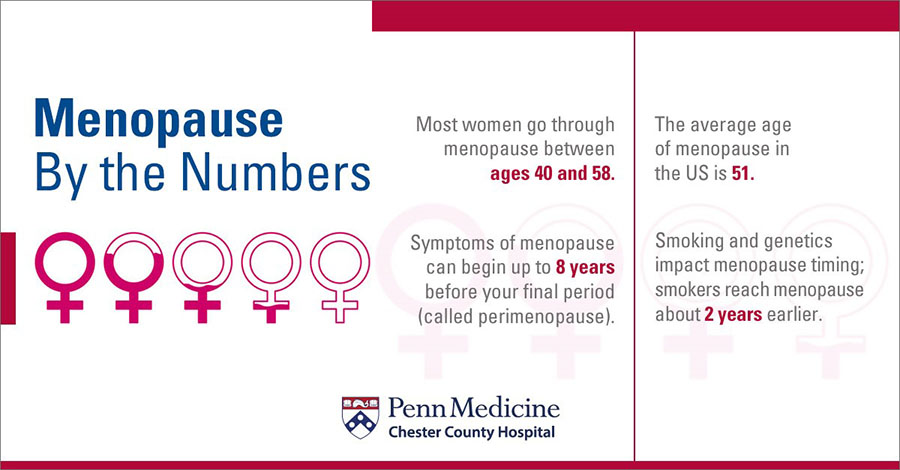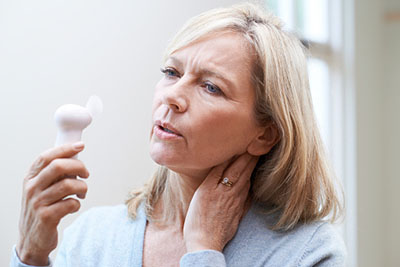From the purchase of a new home to welcoming a family member into the world to simply painting your bedroom walls a new color, change can be exciting. It offers opportunities to grow, experience new adventures, and build cherished memories.
One change that sometimes comes with a less-than-exciting reputation, however, is menopause. Sometimes referred to as "the change of life," menopause simply means the end of a woman's period.
Menopause happens because your ovaries stop producing the hormones called estrogen and progesterone. Officially, you've reached menopause when you haven't had a period for one full year, but changes can start several years before.

Menopause is a completely natural part of being a woman. However, because of symptoms like hot flashes, mood swings, and increased risk of conditions like
osteoporosis, you're not alone if you're struggling to get excited about menopause.
While it's true that menopause can be uncomfortable — and it requires you to be extra vigilant about your health — it's not all bad. Here are 4 reasons to embrace the change of menopause.
1. Menopause means you don't have to deal with tampons, pads, or any other period-related annoyances.
Let's face it — getting your period every month isn't exactly enjoyable. From a last minute run to the pharmacy to replenish your tampon supply to breaking out the heating pad for relentless cramps, your monthly cycle can be a bit of a nuisance.
Also, menstruation is not cheap. The average woman spends up to $300 a year on feminine hygiene disposables like tampons and pads. Because most women menstruate for over 30 years of their lives, that money adds up.
Once you've reached menopause, instead of shelling over cash each month for period-related products, you can save up or treat yourself to something special. And rather than laying on the couch attached to your heating pad, you can spend your cramp-free days however you please.
2. Menopause means you don't have to worry about getting pregnant.

Birth control pills, an IUD, hormonal rings and patches — there are plenty of ways to prevent pregnancy. Whatever your chosen method, you can say goodbye to it after menopause. Since you'll no longer have a monthly period, you can put any worries of getting pregnant behind you.
While this is welcome news to many women, there are two major caveats to keep in mind. First, you can still get pregnant in the months leading up to menopause (called
perimenopause). If you don't want to get pregnant, continue to use birth control until one full year after your last period.
Also, menopause doesn't make you immune to sexually transmitted infections (STIs). In fact, you may have a higher chance of contracting an STI after menopause. This is because the vaginally dryness sometimes associated with menopause can cause tiny tears during sex, making you more exposed to STIs.
If you're not in a monogamous relationship in which you and your partner only have sex with each other, continue to use condoms to protect yourself.
3. Menopause can actually increase your sex drive.
It is true that sexual desire often decreases with age in both men and women, and that women are more likely to experience a wane in sex drive. This may be because of symptoms associated with menopause, such as vaginal dryness, emotional changes, and disturbances in your sleep.
However, this symptom of menopause varies widely from woman to woman. Some women notice no change whatsoever — and some even report a new surge in sexual desire during this time.
Menopause can be a stage of liberation. Whether it's due to no longer having to worry about contraception, a newfound appreciation for your body, or even increased privacy from children moving away, there are plenty of reasons that you may find yourself with more sexual freedom after menopause.
Even if you do experience a drop in sexual desire, there are plenty of ways to improve your sexual health both during the months leading up to menopause and afterward, such as:
- Staying active, which can improve your energy levels, boost your confidence, and enhance your mood
- Having sex more frequently, which can increase blood flow and keep vaginal tissues healthy
- Doing pelvic floor exercises (squeezing the muscles in your genital area as if you were trying to stop the flow of urine), which can increase blood flow and strengthen vaginal muscles
- Allowing more time to become aroused during sex
- Talking to your healthcare provider about products to increase your sex drive
4. Menopause is an ideal time for reflection and personal growth.
Life transitions are excellent opportunities to recognize what past experiences you're grateful for and what future endeavors you can look forward to.
Menopause is a perfect time to reflect on your past, including accomplishments, memories, and what you have learned. After menopause, you can look toward the rest of your life with the confidence and experience of many successful years.
Some ways you can move forward with purpose include:
- Starting an appreciation journal
- Reconnecting with old friends
- Learning a new language
- Taking up a new hobby
However, you envision your future, be sure to make time for yourself, and commit to living in the moment as much as possible.
Menopause may not be all positive — but it's certainly a rite of passage as a woman. By focusing on the positive aspects of menopause, you can make the best of this valuable transition in your life.
Do you have questions about managing your symptoms of menopause? Call 610-738-2300 to find an Ob/Gyn provider Chester County Hospital.
Related Information from Chester County Hospital: